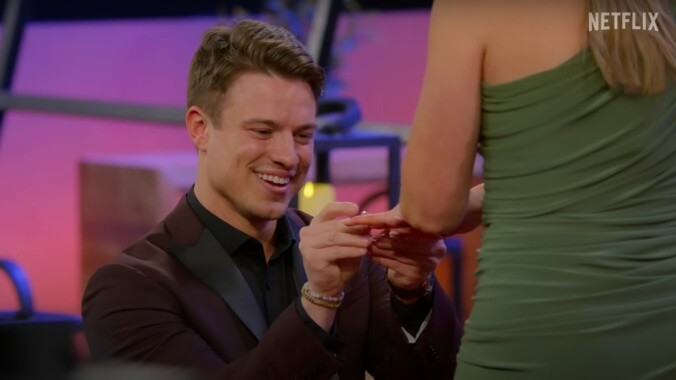While Love May Indeed Be Blind, It Doesn’t Conquer All—Especially Not Politics
Men’s political apathy finally has consequences in Season 8 of Netflix’s Love Is Blind.
Photo: Netflix EntertainmentTV
Late last week, the final batch of episodes in season 8 of Netflix’s Love Is Blind dropped, proving once again that, sure, you can, for the most part, fall in love on reality TV—even “blindly.” Throughout its run, there have been multiple success stories that have emerged from its premise. But this season represented a departure for LIB, which, instead of asking whether you can fall in love without seeing someone, can you marry them without knowing their politics? Turns out the answer is emphatically no.
Each season, the show visits a new city and puts a slew of single people into isolation “pods” (little rooms) where they “date” (talk) in hetero pairings without seeing one another. The couples that forge connections either agree to become engaged and meet in person or break up. The show then follows the engaged couples as they are released back into the wild to prep for their wedding day, which takes place about one month after the proposal.
When it comes to politics, discussions have been few and far between. One douchebaggy guy used his fiancé’s casually mentioned pro-choice stance to make her look bad in front of his family; another couple vaguely discussed the politics of race in the context of being an interracial couple. But otherwise, producers have largely avoided the topic of politics as such. But in Season 8, which was filmed in Minneapolis between February and March 2024, two out of the four engaged couples broke up at the alter over misaligned worldviews.
Social issues had the most obvious impact in the (eventual) demise of Ben Mezzenga and Sara Carton. Early in the pods, Sara brings up the topic of LGBTQ rights, because her sister, one of the most important people in her life, is gay. Ben says he doesn’t think being gay is a sin and that he has “no discomfort around that community at all,” and he has friends who are “that way.” When Sara brings up George Floyd, a Black man whose murder by a white police officer in Minneapolis sparked enormous protests across America, Ben’s thoughts on the matter are that he basically has none: “Not one way or another, I just kind of keep out of it.”
-

-

-

-

-

-

-

-

-

-

-

-

-

-

-

-

-

-

-

-

-

-

-

-

-

-

-

-

-

-

-

-

-

-

-

-

-

-

-

-








































